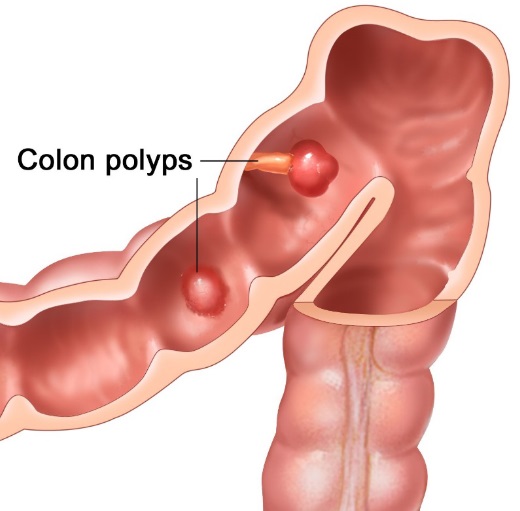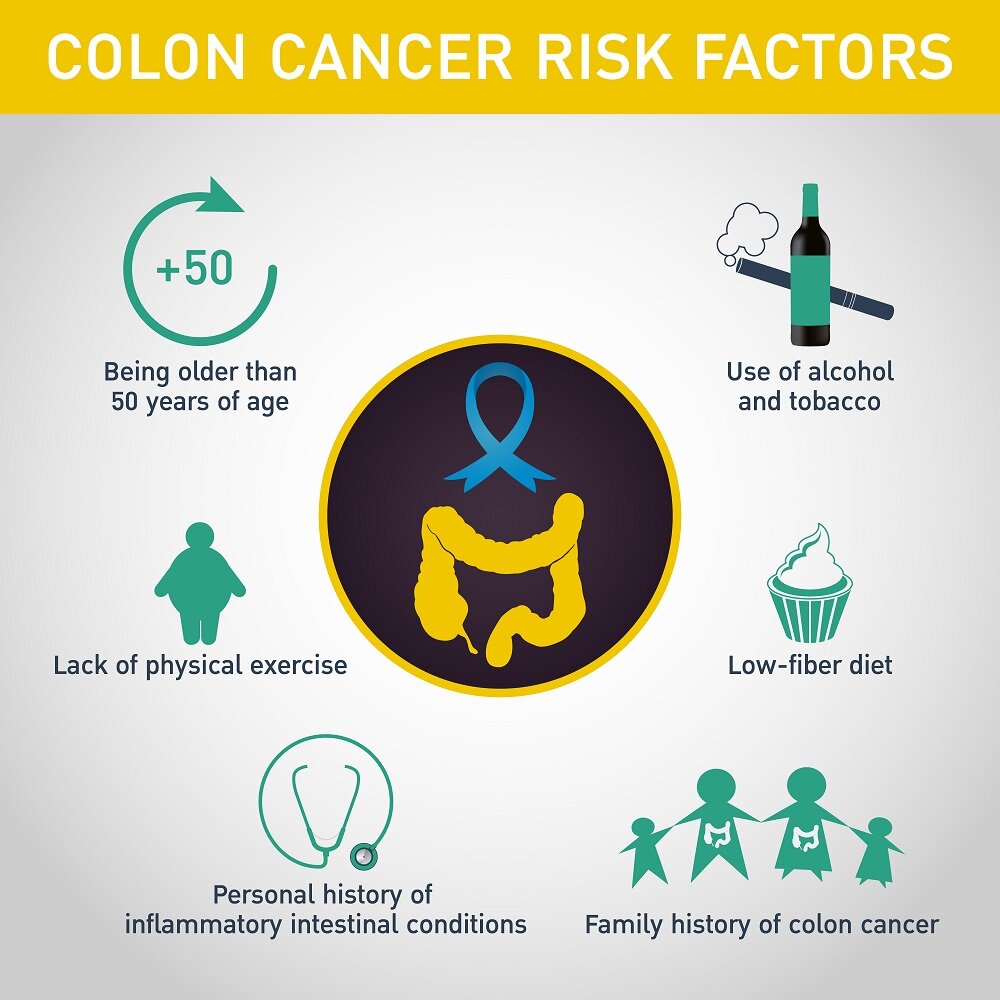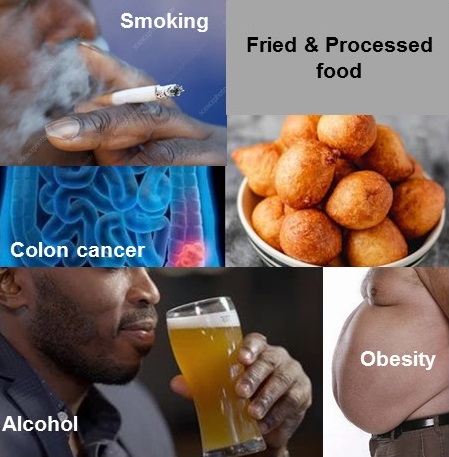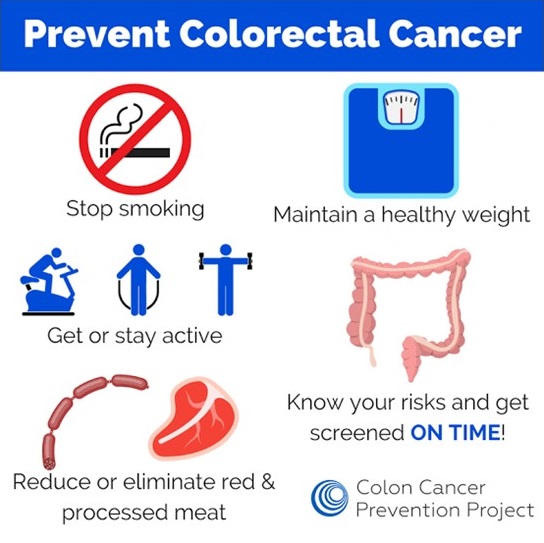
A black man in business shirt standing and holding his tummy in a way suggesting ache.
Image credit: krakenimages.com on Freepik
Colon cancer also known as colorectal cancer is a growth of cells that begins as a small cancerous growth of cells called polyps that form on the inside of the colon.
In Sub-Sahara Africa, colon cancer is considered to be the 5th commonest cancer with an estimated incidence rate of 4.04 per 100 000 population (4.38 for men and 3.69 for women). [1] This is very likely an under-estimation.

Cartoon illustration of teo types of polyps in the colon
Image Credit.
Colon cancer usually begins as a small, noncancerous (benign) growth of cells called polyps that form on the inside of the colon. Over time some of these polyps can become cancers.
Polyps may be small and produce few, if any, symptoms. For this reason, doctors recommend regular screening tests to help prevent colon cancer by identifying and removing polyps before they turn into cancer. [2]

Cartoon illustration of some colon cancer risks
Image Credit
A detailed descriptions of each of the factors follow in no particular order. More information can be obtained from here.

An elderly African map wearing caftan and a blackcap, seated and holding a cane
Age is an inevitable risk factor of colon cancer. The risk increases as you get older with an average age of 66 for men and 69 for women.
Although colon cancer is more common among the aged, lately it has been recorded that colon cancer is rising among people younger than 50. [3] The reasons are not certain. However scientists are linking it to poor diet and lack of physical activity.

A black family photo with a young adult female child standing behind her elderly seated parents
Cancer is mostly caused by changes in the DNA, a substance in our cells that makes up our genes. There is a certain gene called tumour suppressor genes which helps to keep cell division under control. A change/mutation in the DNA composition causes this tumour suppressor genes to turn off thereby giving room for the cells in our body to grow out of proportion.
The mutated gene can be passed on in families as inherited mutation. This inherited gene mutation may then contribute to the development of colorectal cancer in offsprings of affected parents.
Therefore the chances of having colon cancer is high if a close relative is diagnosed at a younger age.

A collection of diverse multiracial people
Image Credit: Freepik.
In terms of race black people in and out of Africa are more likely to die from colon cancer compared to any other racial group [4, 5] at a rate of at least 20% greater than that of the white race. The reasons for this are not precisely known, but researchers think they have some ideas.
In relation to the environment, the low socioeconomic status, poor nutrition and lack of adequate medical care are suggested as contributors to the high occurrence of colon cancer among the blacks.

Elderly black couple in happy mood.
Credit: kues1 on Freepik
Men are at higher risk of developing colon cancer than women. The contributing factor to this effect is most likely due to the hormonal differences. Oestrogen level in women probably plays a protective role thereby reducing their susceptibility to colon cancer [6].

Varieties of unhealthy lifestyle habits considered as risk factors for Colon cancer
A strong lifestyle factor that contributes to cancer generally, and colon cancer is not excluded, is obesity. It is deduced that extra fat in the tissue produces hormones and other chemicals that alters the way our cell works to increase the probability of cells DNA being damaged and causing cancer to develop. More research is needed to ascertain this deduction.
Other lifestyle factors that can contribute to the development of colon cancer include;

A doctor in consultation with a patient at checkup
Image credit: Freepik
Irrespective of the risk factors of colon cancer, regular colon cancer screening is recommended for early prevention, detection and effective treatment [7, 8]. This screening is conducted using colonoscopy, a tool used in identifying and removing pre-cancerous polyps before they develop into cancer.
The above goes a long way in saving lives and contributing to people’s quality of life. This by chance can help reduce colon cancer from being the second leading cause of cancer related deaths worldwide with over 930,000 deaths in the year 2020.

Illustration of preventive approaches to colon cancer
Image credit: Colon cancer prevention project
There are no specific prevention methods for colon cancer. But the following are known to be contributory in preventing the condition. [9]
1). Graham A, Adeloye D, Grant L, Theodoratou E, Campbell H. Estimating the incidence of colorectal cancer in Sub-Saharan Africa: A systematic analysis. J Glob Health. 2012 Dec;2(2):020404. doi: 10.7189/jogh.02.020204, Available from here.
2) Datelinehealth Africa. Colon cancer: Symptoms, Causes, Risk factors, Diagnosis Treatment and Prevention. Available here.
3) UCDavis Health. Colon cancer is on the rise in younger adults: What you should look for. [Internet. March 06, 2023]. Accessed May 27, 2024. Available from here.
4). Carethers JM. Racial and ethnic disparities in colorectal cancer incidence and mortality, Chapter 6 in Advances in Cancer Research, Academic Press, Editor(s): Franklin G. Berger, C. Richard Boland. 2021. Volume 151, Pages 197-229. doi: 10.1016/bs.acr.2021.02.007. Available from here.
5). Caporuscio J. Racial disparities in colorectal cancer. [Internet. 2023. July 3]. Medical News Today. Accessed May 27, 2024. Available from here.
6). Gastroenterology Consultants of San Antonio. Are men or women at higher risk for colorectal cancer? [Internet. March 11, 2024]. Accessed May 27, 2024. Available from here.
7). American Cancer Society. Can Colorectal Polyps and Cancer Be Found Early? [Internet. Last reviewed, January 29, 2024]. Accessed May 14, 2024. Available from here.
8). American Cancer Society. Colorectal Cancer Early Detection, Diagnosis, and Staging. [Internet n.d]. Accessed May 14, 2024. Available from here.
9). SITEMAN Cancer Center. 8 ways to prevent colon cancer. [Internet n.d]. Accessed May 14, 2024. Available from here.
Related
Colon Cancer: Screening and Prevention.
Colon Cancer: Diagnosis and Treatment.
Colon cancer: Symptoms, Causes, Risk factors
Published July 5, 2020
© 2024, Datelinehealth Africa Inc. All rights reserved.
Permission is given to copy, use and share content for non-commercial purposes without alteration or modification and subject to source attribution.